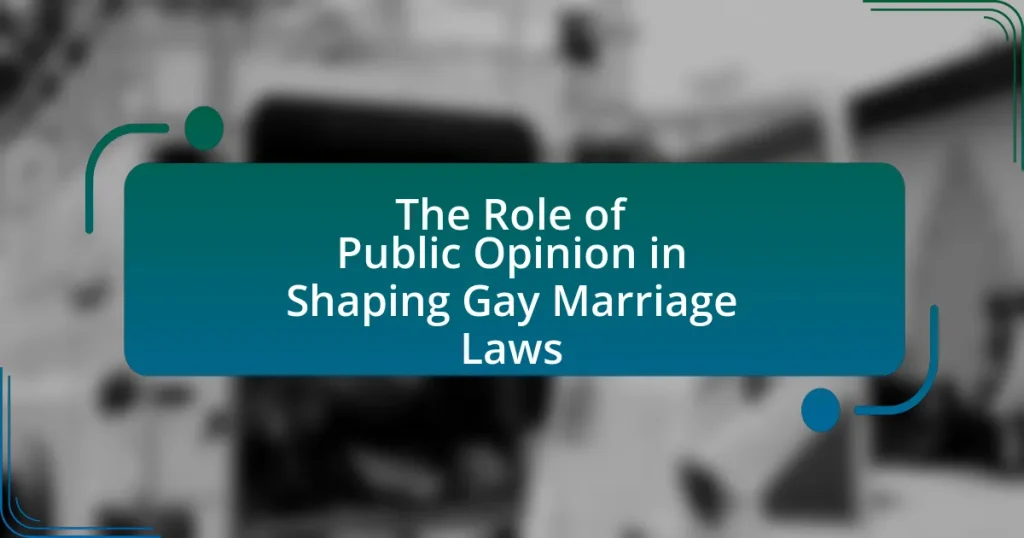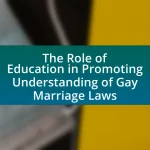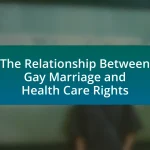The article examines the significant role of public opinion in shaping gay marriage laws, highlighting how evolving societal attitudes influence legislative and judicial outcomes. It discusses the correlation between public support for same-sex marriage and the actions of lawmakers, as evidenced by polling data showing a rise in support from 27% in 1996 to 70% in 2021. Key historical events, cultural factors, and the impact of advocacy groups are analyzed to illustrate how public sentiment drives legal reforms. Additionally, the article explores the mechanisms through which public opinion affects policy decisions and the implications for future legislation on gay marriage.
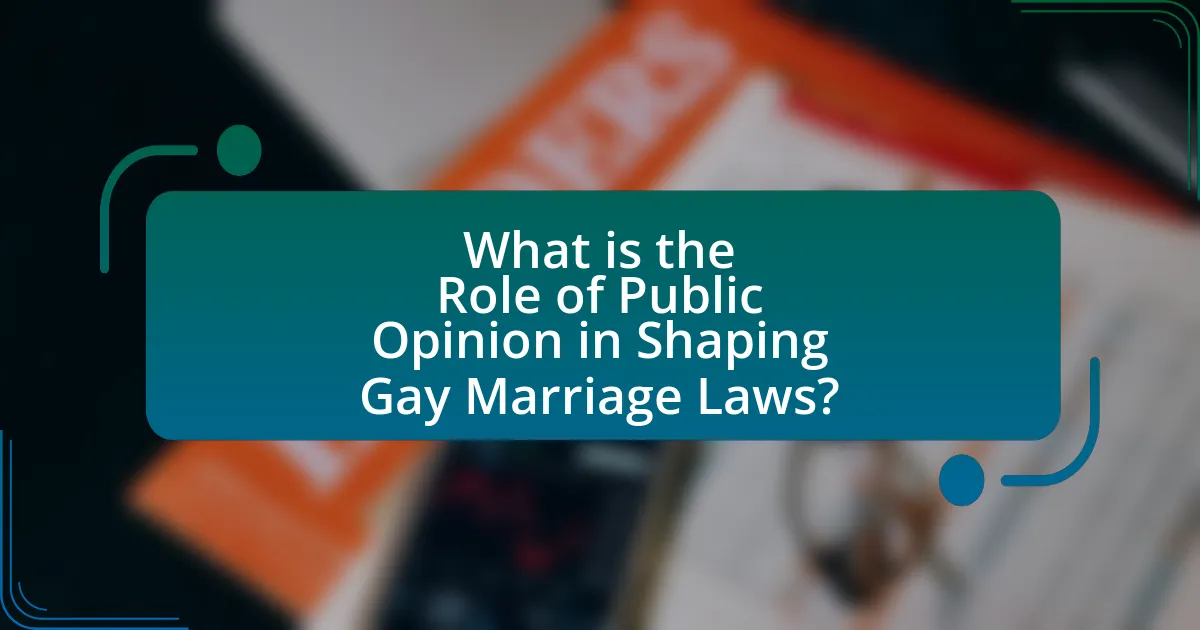
What is the Role of Public Opinion in Shaping Gay Marriage Laws?
Public opinion plays a crucial role in shaping gay marriage laws by influencing policymakers and legislative outcomes. As societal attitudes toward same-sex marriage have evolved, public support has significantly increased, with a Gallup poll in 2021 indicating that 70% of Americans favored legalizing gay marriage. This shift in public sentiment has prompted lawmakers to respond to constituents’ views, leading to the legalization of gay marriage in numerous states and at the federal level, as seen in the Supreme Court’s 2015 decision in Obergefell v. Hodges, which legalized same-sex marriage nationwide. Thus, public opinion not only reflects societal values but also drives legal changes regarding gay marriage.
How does public opinion influence legislative decisions regarding gay marriage?
Public opinion significantly influences legislative decisions regarding gay marriage by shaping lawmakers’ perceptions of voter preferences and electoral consequences. When a majority of the public supports gay marriage, legislators are more likely to advocate for or vote in favor of related legislation to align with constituents’ views and secure electoral support. For instance, a 2019 Gallup poll indicated that 70% of Americans supported same-sex marriage, which has led to increased legislative action in favor of such laws across various states. This correlation between public sentiment and legislative behavior demonstrates that elected officials often respond to shifts in public opinion to maintain their political viability and reflect the values of their electorate.
What historical events have shaped public opinion on gay marriage?
Key historical events that have shaped public opinion on gay marriage include the Stonewall Riots of 1969, which marked a significant turning point in the LGBTQ+ rights movement, leading to increased visibility and activism. The 1996 Defense of Marriage Act (DOMA) further polarized opinions by defining marriage as between one man and one woman, while the 2003 Supreme Court case Lawrence v. Texas decriminalized same-sex sexual activity, contributing to a shift in societal attitudes. The 2015 Supreme Court ruling in Obergefell v. Hodges legalized same-sex marriage nationwide, reflecting and reinforcing changing public sentiments. Polls indicate that support for gay marriage has steadily increased over the decades, with a 2021 Gallup poll showing 70% of Americans in favor, illustrating the impact of these historical events on public opinion.
How do cultural factors impact public perception of gay marriage?
Cultural factors significantly influence public perception of gay marriage by shaping societal norms, values, and beliefs. For instance, in cultures where traditional family structures are highly valued, opposition to gay marriage tends to be stronger, as seen in many conservative religious communities. Conversely, in more liberal societies that prioritize individual rights and equality, support for gay marriage is more prevalent, as evidenced by the legalization of gay marriage in countries like Canada and the Netherlands, where public opinion shifted positively over time. Research from the Pew Research Center indicates that acceptance of gay marriage has increased globally, correlating with cultural shifts towards inclusivity and diversity, highlighting the direct impact of cultural factors on public attitudes.
Why is public opinion important in the context of gay marriage laws?
Public opinion is crucial in the context of gay marriage laws because it influences legislative decisions and judicial outcomes. When a significant portion of the population supports gay marriage, lawmakers are more likely to enact laws that reflect this sentiment, as seen in the United States where public support for same-sex marriage rose from 27% in 1996 to 70% in 2021, leading to the legalization of gay marriage in many states. Additionally, public opinion can impact court rulings; for instance, the Supreme Court’s decision in Obergefell v. Hodges (2015) was influenced by the shifting societal attitudes towards same-sex marriage, which had gained widespread acceptance. Thus, public opinion serves as a driving force in the evolution and establishment of gay marriage laws.
What role do polls and surveys play in gauging public sentiment?
Polls and surveys are essential tools for gauging public sentiment, as they systematically collect data on individuals’ opinions and attitudes. These instruments provide quantitative insights that reflect the prevailing views within a population, allowing researchers and policymakers to understand shifts in public opinion over time. For instance, a 2021 Gallup poll indicated that 70% of Americans supported same-sex marriage, highlighting a significant change from 27% in 1996. This data not only illustrates the evolving acceptance of gay marriage but also informs legislative decisions and advocacy strategies. By analyzing trends in polling data, stakeholders can better align their efforts with the public’s evolving sentiments, ultimately influencing the legal landscape surrounding gay marriage.
How does public opinion affect judicial rulings on gay marriage?
Public opinion significantly influences judicial rulings on gay marriage by shaping the legal landscape and the decisions of judges. As societal attitudes toward same-sex marriage have evolved, courts have often aligned their rulings with the prevailing public sentiment, reflecting a broader acceptance of LGBTQ+ rights. For instance, the U.S. Supreme Court’s decision in Obergefell v. Hodges (2015) legalized same-sex marriage nationwide, coinciding with a dramatic increase in public support for gay marriage, which rose from approximately 27% in 1996 to over 60% by 2015, according to Gallup polls. This alignment suggests that judges may consider public opinion as a factor in their rulings, particularly in cases that address social issues, thereby reinforcing the notion that judicial decisions can be influenced by the values and beliefs of the society they serve.
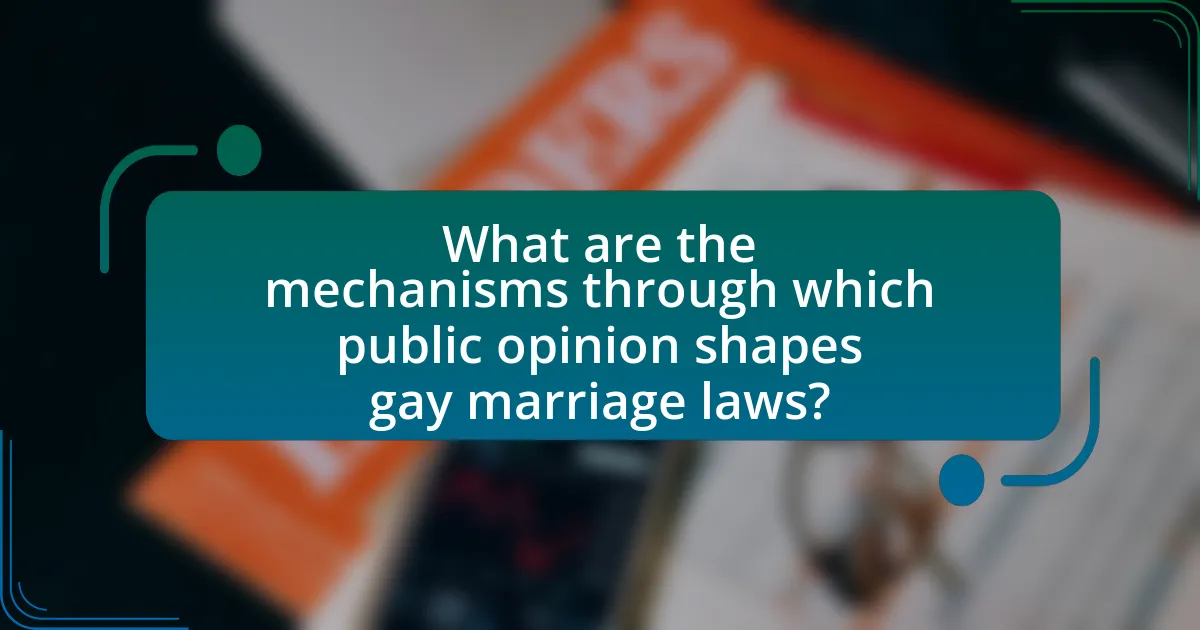
What are the mechanisms through which public opinion shapes gay marriage laws?
Public opinion shapes gay marriage laws primarily through electoral influence, advocacy, and social movements. When a significant portion of the population supports gay marriage, elected officials are more likely to respond to this sentiment by proposing or voting for legislation that legalizes it. For instance, polls in the United States showed a dramatic increase in support for same-sex marriage from 27% in 1996 to over 60% by 2019, prompting lawmakers to introduce and pass marriage equality laws in various states. Additionally, organized advocacy groups leverage public opinion to mobilize campaigns, raise awareness, and influence political discourse, as seen with organizations like the Human Rights Campaign. Social movements also play a critical role by fostering community engagement and shifting cultural norms, which can lead to changes in public sentiment and, consequently, legal reforms.
How do advocacy groups leverage public opinion to influence policy?
Advocacy groups leverage public opinion to influence policy by mobilizing grassroots support and utilizing media campaigns to shape narratives. These organizations often conduct surveys and polls to gauge public sentiment, which they then use to demonstrate widespread support for specific policies, such as gay marriage. For instance, the Human Rights Campaign effectively utilized public opinion data showing increasing acceptance of same-sex marriage to advocate for legislative changes, contributing to the legalization of gay marriage in various states. By framing their messages to resonate with public values and emotions, advocacy groups can create a sense of urgency and importance around their causes, thereby pressuring policymakers to align with the prevailing public opinion.
What strategies do these groups use to shift public perception?
Advocacy groups use targeted messaging, personal storytelling, and social media campaigns to shift public perception regarding gay marriage laws. Targeted messaging focuses on framing the issue in relatable terms, emphasizing equality and human rights, which resonates with broader audiences. Personal storytelling involves sharing individual experiences of LGBTQ+ individuals and their families, fostering empathy and understanding among the public. Social media campaigns leverage platforms to amplify these messages, engage with supporters, and counteract misinformation, effectively reaching diverse demographics. Research by the Pew Research Center indicates that increased visibility and personal connections significantly influence public attitudes toward gay marriage, demonstrating the effectiveness of these strategies.
How do social media and technology impact public discourse on gay marriage?
Social media and technology significantly influence public discourse on gay marriage by facilitating rapid information dissemination and enabling diverse viewpoints to be shared widely. Platforms like Twitter and Facebook allow individuals and organizations to express their opinions, mobilize support, and challenge opposing views, which can shape public perception and policy discussions. For instance, the 2015 U.S. Supreme Court ruling in Obergefell v. Hodges, which legalized same-sex marriage, was preceded by extensive online advocacy and campaigns that garnered millions of interactions, demonstrating how digital engagement can sway public opinion and legislative outcomes.
What role do political leaders play in reflecting or shaping public opinion?
Political leaders play a crucial role in both reflecting and shaping public opinion, particularly in the context of social issues like gay marriage laws. They often gauge public sentiment through polls and surveys, which informs their policy decisions and public statements. For instance, during the legalization of gay marriage in the United States, leaders such as President Barack Obama publicly shifted their stance to support same-sex marriage, reflecting a growing acceptance among the electorate. This shift not only mirrored public opinion but also helped to further shape it by legitimizing and normalizing the conversation around gay marriage, influencing public attitudes and encouraging broader acceptance.
How do elected officials respond to changes in public sentiment regarding gay marriage?
Elected officials often adjust their positions on gay marriage in response to shifts in public sentiment. For instance, as public support for gay marriage increased significantly in the United States, many politicians began to advocate for legalization, reflecting the changing views of their constituents. A notable example is President Barack Obama, who publicly endorsed gay marriage in 2012, aligning with a growing majority of Americans who supported it, as evidenced by a Gallup poll showing 53% approval at that time. This alignment with public opinion can influence legislative actions, as elected officials seek to maintain voter support and ensure their political survival.
What are the consequences of political alignment with public opinion on gay marriage laws?
Political alignment with public opinion on gay marriage laws leads to the enactment of more inclusive legislation and increased societal acceptance. When lawmakers align their policies with the prevailing public sentiment, as evidenced by the 2015 Supreme Court decision in Obergefell v. Hodges, which legalized same-sex marriage nationwide, it reflects a significant shift in public opinion favoring marriage equality. This alignment not only legitimizes the rights of LGBTQ+ individuals but also influences future political campaigns and party platforms, as seen in the Democratic Party’s increasing support for LGBTQ+ rights in response to changing voter attitudes.
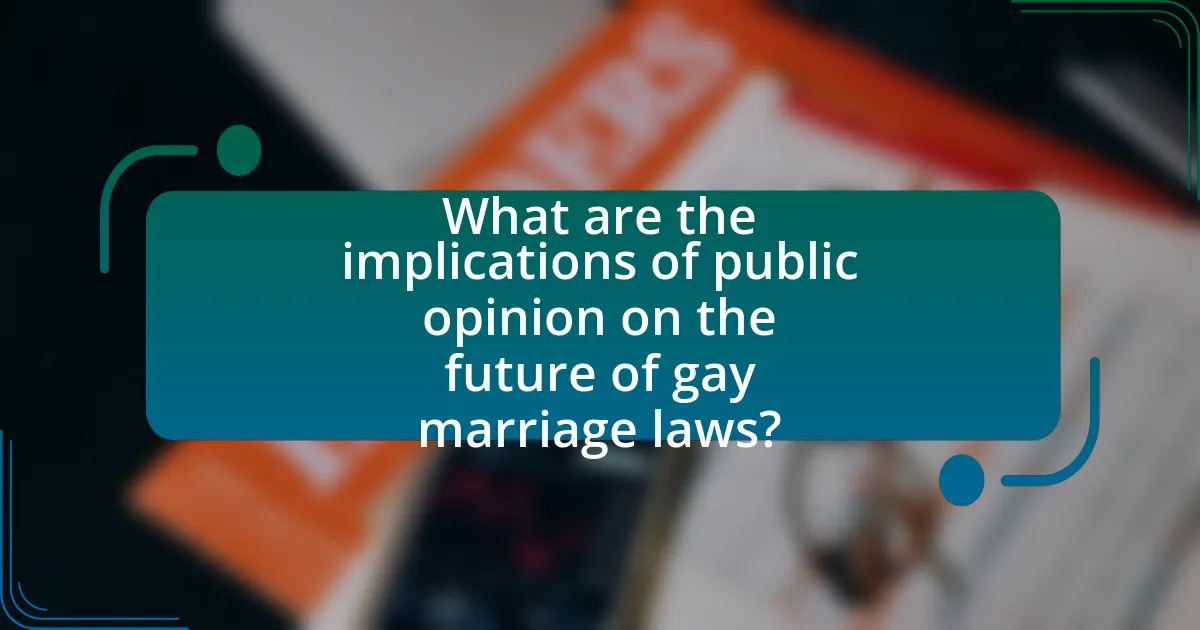
What are the implications of public opinion on the future of gay marriage laws?
Public opinion significantly influences the future of gay marriage laws by shaping legislative agendas and judicial decisions. As societal acceptance of same-sex marriage increases, evidenced by a Gallup poll showing that support for gay marriage rose from 27% in 1996 to 70% in 2021, lawmakers are more likely to propose and enact laws that reflect this changing sentiment. Additionally, public opinion can impact court rulings; for instance, the U.S. Supreme Court’s decision in Obergefell v. Hodges (2015) was influenced by the growing acceptance of same-sex marriage among the populace. Thus, as public opinion continues to evolve, it will likely lead to further legal advancements and protections for gay marriage.
How might changing public attitudes affect future legislation on gay marriage?
Changing public attitudes can significantly influence future legislation on gay marriage by creating a more favorable environment for lawmakers to enact supportive policies. As public support for gay marriage has increased—evidenced by a Gallup poll in 2021 showing that 70% of Americans favored legalizing same-sex marriage—legislators are more likely to respond to constituents’ views and push for laws that reflect this shift. This correlation between public opinion and legislative action is further supported by historical trends, such as the rapid legalization of gay marriage across various states following increased public acceptance, demonstrating that lawmakers often align their decisions with the evolving sentiments of their electorate.
What trends are emerging in public opinion regarding gay marriage?
Public opinion regarding gay marriage is increasingly supportive, with a significant majority of Americans now favoring its legalization. According to a Gallup poll conducted in 2021, 70% of respondents supported same-sex marriage, reflecting a steady rise from just 27% in 1996. This shift indicates a broader acceptance of LGBTQ+ rights and has influenced legislative changes across various states, leading to the legalization of gay marriage in numerous jurisdictions. The trend shows that younger generations are particularly more accepting, with support levels exceeding 80% among those aged 18 to 29, further solidifying the trajectory towards greater acceptance and legal recognition of gay marriage.
How can shifts in public opinion lead to changes in legal frameworks?
Shifts in public opinion can lead to changes in legal frameworks by influencing lawmakers to align legislation with the evolving views of their constituents. For instance, as public support for gay marriage increased significantly in the United States, from approximately 27% in 1996 to over 60% by 2019, legislators responded by introducing and passing laws that legalized same-sex marriage in various states. This culminated in the landmark Supreme Court decision in Obergefell v. Hodges (2015), which legalized gay marriage nationwide, reflecting the substantial shift in societal attitudes. Such changes demonstrate how public sentiment can drive legal reforms, as elected officials often seek to represent the values and beliefs of the electorate to maintain their political support.
What best practices can advocates employ to effectively shape public opinion on gay marriage?
Advocates can effectively shape public opinion on gay marriage by employing strategies such as personal storytelling, leveraging social media, and engaging in community outreach. Personal storytelling humanizes the issue, making it relatable; for instance, sharing personal experiences can evoke empathy and understanding among audiences. Social media platforms allow advocates to reach a broader audience quickly, facilitating discussions and sharing informative content that counters misinformation. Community outreach initiatives, such as organizing events or workshops, foster direct engagement and dialogue, helping to dispel myths and build support. Research indicates that exposure to personal narratives significantly increases support for gay marriage, demonstrating the effectiveness of these practices in influencing public opinion.
